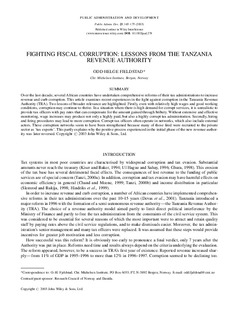Fighting fiscal corruption: Lessons from the Tanzania Revenue Authority
Journal article, Peer reviewed
Permanent lenke
http://hdl.handle.net/11250/2475000Utgivelsesdato
2003-01-01Metadata
Vis full innførselSamlinger
- Publications [1488]
Sammendrag
Over the last decade several African countries have undertaken comprehensive reforms of their tax administration to increase revenue and curb corruption. This paper examines recent experiences in the fight against corruption in the Tanzania Revenue Authority. Two lessons of broader relevance are highlighted. Firstly, even with relatively high wages and good working conditions, corruption may continue to thrive. In a situation where there is high demand for corrupt services, it is unrealistic to provide tax officers with pay rates that can compensate for the amount gained through bribery. Without extensive and effective monitoring, wage increases may produce a highly paid but also highly corrupt tax administration. Secondly, hiring and firing procedures may lead to more corruption. Corrupt tax officers often operate in networks, which also include external actors. These corruption networks seem to have been strengthened because many of those fired were recruited to the private sector as 'tax experts'. This partly explains why the positive process experienced in the initial phase of the new revenue authority was later reversed.
Serie
Public Administration and Development vol. 23 no. 2Public Administration and Development vol. 23 no. 2
